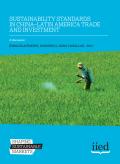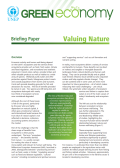Albania’s energy consumption per capita and its CO2 emissions per capita are low, but due to outdated technologies in many sectors energy intensity is still high. Concerning energy supply, the share of renewable energy sources has contributed about 18–22 per cent of the primary energy balance, but the main role has been played by oil products, electricity, fuel woods and LPG.
Although Albania has a relatively comprehensive legislative framework governing energy politics and climate change comprising a wide range of topics, it still lacks legislation in some areas (energy conservation, renewable energy). The most important document for green growth is the (updated) National Energy Strategy. The Ministry of Environment, Forests and Water Administration (MoEFWA), is the government body responsible for environmental issues and policy.
The long-term vision of the High-Level Panel on Global Sustainability is to eradicate poverty, reduce inequality and make growth inclusive, and production and consumption more sustainable, while combating climate change and respecting a range of other planetary boundaries. This report makes a range of recommendations to take forward the Panel’s vision for a sustainable planet, a just society and a growing economy by concentrating on empowerment, strengthening institutional governance and working towards a sustainable economy.
This summary was prepared by Eldis.


At a more fundamental level, healthy ecosystems represent the foundation of economic activity and a prerequisite for achieving a green economic transition. Given this, it is essential that the economic value of these services are recognized, demonstrated and captured in the accounts and decision-making of governments, the private sector and consumers
This publication summarises the proceedings of a conference organised during April 2012 in Lisbon by the think tank Platform for Sustainable Growth (Plataforma para o Crescimento Sustentável) on the topic “How can we foster green growth?” Speakers included António Costa e Silva (CEO of Partex), Joy Kim (Advisor at United Nations Environmental Programme), Peter Vis (Chief of Cabinet of the EU Commissioner on Climate Action) and Carlos Pimenta (Coordinator of Sustainability at PCS). The aim of the event and the follow-up publication was to identify the role green economy can play to achieve sustainable growth in Europe in general and Portugal in particular.
